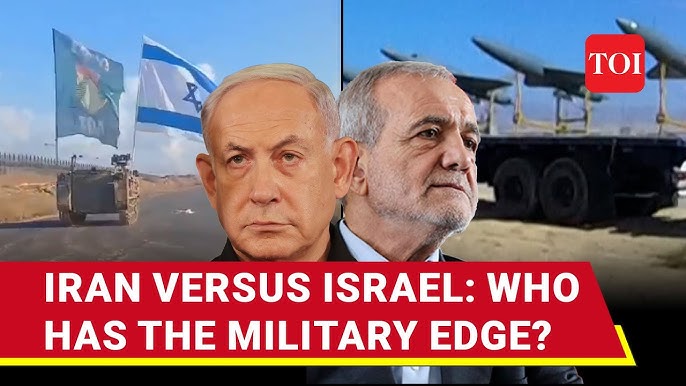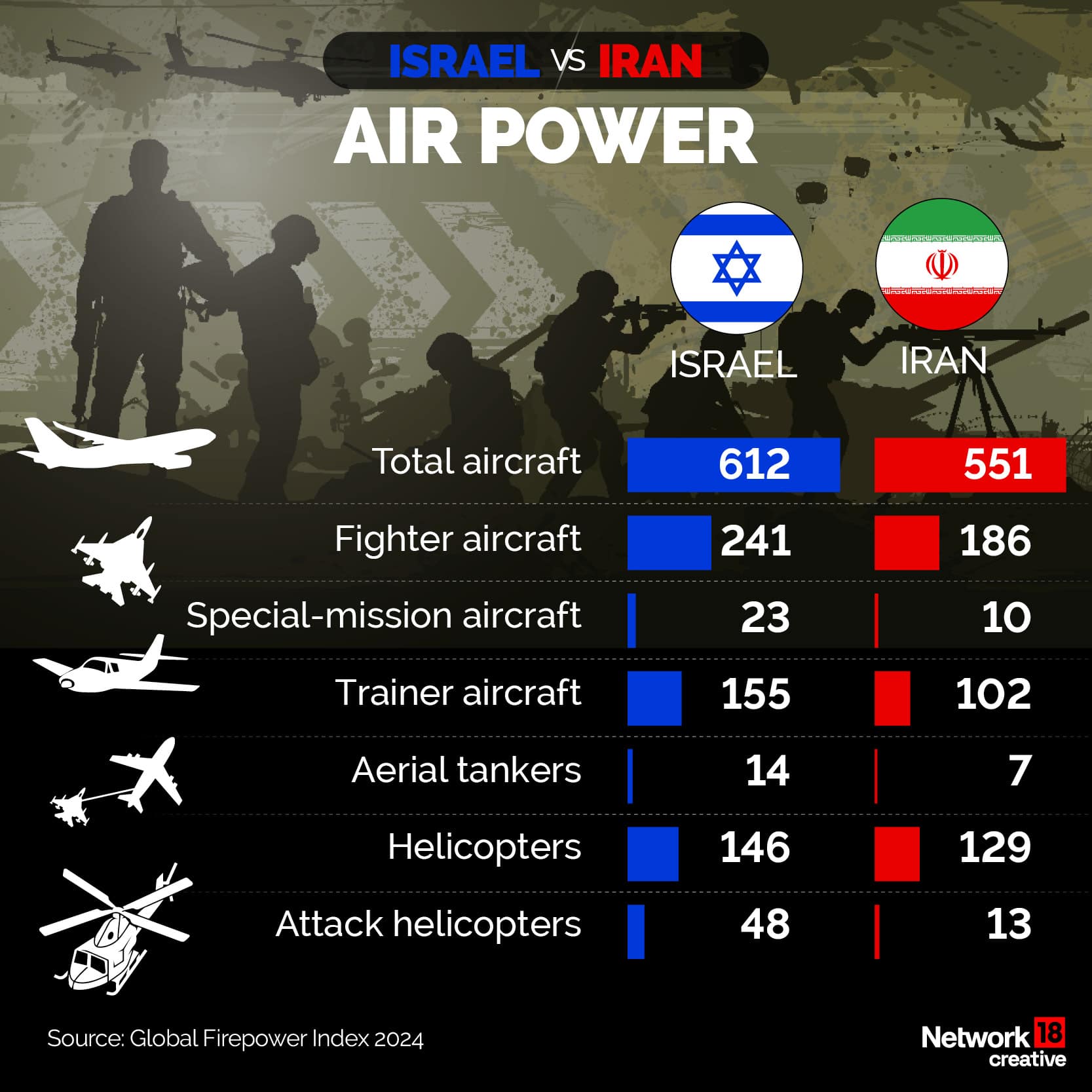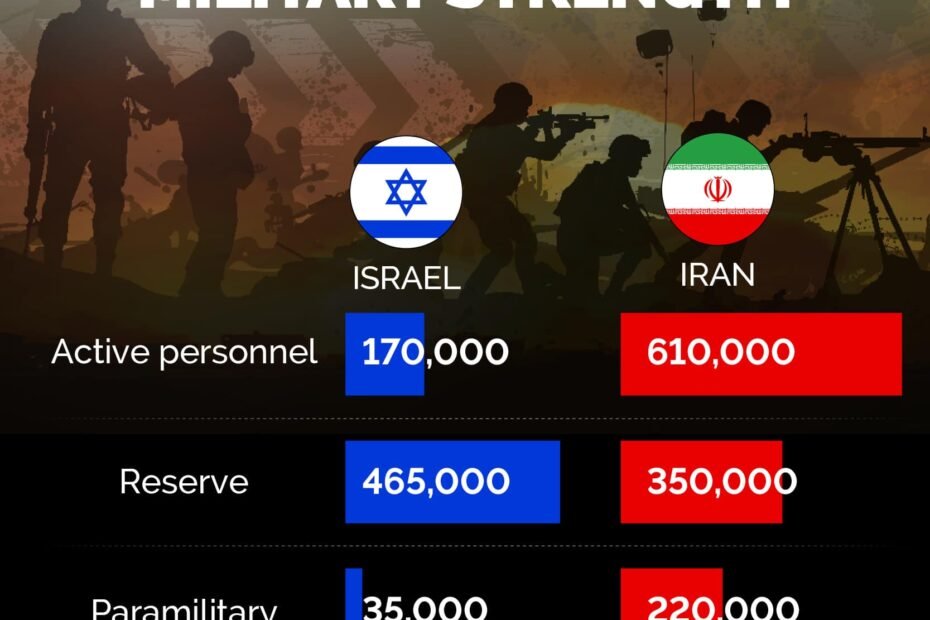Are you curious about the military might of two powerful nations, Iran and Israel? As you explore this complex topic, you’ll uncover fascinating insights about their strengths, strategies, and capabilities.
You might wonder which country truly holds the upper hand when it comes to defense and power. We’ll dive deep into the factors that shape the military prowess of Iran and Israel, helping you understand the nuances that make this comparison so intriguing.
Get ready to discover the key elements that could influence global security and your perception of these nations. Keep reading to find out more!

Credit: www.youtube.com
Military Size And Composition
Iran’s military size surpasses Israel’s in terms of personnel and equipment. Despite fewer numbers, Israel’s forces are highly trained and technologically advanced. Comparing strength involves evaluating military composition, strategy, and alliances.
Understanding the military size and composition of Iran and Israel is crucial in assessing their relative strength. These two nations have long been perceived as rivals in the Middle East. By examining the numbers and structure of their forces, we gain insights into their military capabilities and readiness. Let’s dive into the details to see how these countries stack up against each other. ###Troop Numbers
Iran boasts a substantial active military force, with around 525,000 active personnel. This makes it one of the largest in the region. Comparatively, Israel maintains a smaller active duty force of approximately 170,000. While Israel’s numbers may seem modest, it’s important to consider their technological edge and strategic alliances. Numbers alone don’t tell the whole story. ###Reserve Forces
The reserve forces play a critical role, especially in times of conflict. Iran has around 350,000 reservists ready to be called upon. Israel, on the other hand, has a robust reserve force of about 450,000. This is significant, considering the smaller size of its active troops. Many Israelis, having served in the military, are well-prepared to be mobilized swiftly, adding a layer of readiness to their defense strategy. ###Military Branches
Iran’s military is divided into several branches: the Islamic Republic of Iran Army, the Islamic Revolutionary Guard Corps (IRGC), and the Law Enforcement Force. The IRGC is particularly influential, with its own ground, naval, and air units. Israel’s defense structure consists of the Israel Defense Forces (IDF), which includes the army, navy, and air force. The IDF is renowned for its advanced technologies and strategic innovations. Despite the difference in branch composition, both nations emphasize different strengths. Iran leans on its large manpower, while Israel focuses on agility and technology. As you think about these differences, consider the impact of quality versus quantity. Does a larger force guarantee strength, or does the edge come from technology and experience? Your perspective might change how you view these military giants.Defense Budgets
Iran and Israel have different military strengths influenced by their defense budgets. Iran focuses on regional influence with a strong missile program. Israel maintains advanced technology and air superiority.
When discussing the military strength of Iran and Israel, the Defense Budgets of these countries play a crucial role. The budget allocated to defense not only reflects the priorities of a nation but also determines the scale and capability of its military forces. Both Iran and Israel have distinct strategies influenced by their geopolitical contexts, and this is mirrored in their defense spending.Spending Trends
Iran’s defense budget has shown fluctuations over the years, often influenced by international sanctions and economic conditions. Despite these challenges, Iran has managed to maintain a significant military presence by focusing on regional influence. In contrast, Israel consistently allocates a substantial portion of its GDP to defense. This is largely due to its strategic need to maintain a technological edge over potential adversaries. One might wonder how these spending trends impact the actual capabilities of each country’s military.Economic Impact
The economic ramifications of defense spending in both countries are profound. In Iran, extensive military funding can strain the national economy, affecting public services and infrastructure. This can lead to public discontent, impacting the country’s stability. Israel, on the other hand, has successfully integrated its defense budget with its tech-driven economy. Military innovations often spill over into the civilian sector, fueling economic growth. Have you ever considered how a nation’s defense budget might affect its citizens’ daily lives? The economic impact goes beyond numbers, shaping the very fabric of society. Understanding these dynamics can provide valuable insights into the broader question of military strength.Technological Advancements
Iran and Israel’s military strengths are often compared due to technological advancements. Iran focuses on missile technology and cyber warfare. Meanwhile, Israel invests heavily in defense systems and intelligence.
Iran and Israel stand as two key players in the Middle East. Their military capabilities draw significant attention globally. Technological advancements play a crucial role in shaping military strength. Both nations invest heavily in technology to bolster their defenses. Let’s explore the intricacies of their technological capabilities.Weapon Systems
Iran and Israel have developed advanced weapon systems. Iran focuses on missile technology. It boasts a range of ballistic missiles with varying ranges. Israel’s weaponry emphasizes precision and sophistication. The country manufactures drones and advanced air defense systems. Both nations continually upgrade their arsenals. This arms race fuels regional tensions.Cyber Warfare
Cyber warfare is a modern battlefield. Iran and Israel recognize its importance. Iran invests in cyber capabilities for defense and offense. It aims to protect critical infrastructure. Israel is a leader in cybersecurity innovation. The nation has several tech companies specializing in cyber defense. Both countries understand the power of cyber strategies. They build their defenses to counter digital threats. These technological advancements shape their military strategies. Both nations strive for superiority in a complex geopolitical landscape.Nuclear Capabilities
The question of nuclear capabilities often stirs debates when discussing the military strength of Iran compared to Israel. Both nations have unique positions in the global nuclear landscape, with implications that affect regional and international security. Understanding their nuclear arsenals and international commitments provides insight into their military power.
Nuclear Arsenal
Iran’s nuclear ambitions have been a source of global concern for decades. Despite international scrutiny, Iran continues to advance its nuclear technology. However, it is widely believed Iran does not possess nuclear weapons as of now.
Israel, on the other hand, maintains an ambiguous policy regarding its nuclear arsenal. While Israel has never officially confirmed it, many experts believe the country possesses a significant number of nuclear warheads. This alleged capability positions Israel uniquely in the Middle Eastern geopolitical landscape.
Given these dynamics, how do you perceive the balance of power? Is the potential for nuclear development more concerning than existing arsenals?
International Agreements
Iran’s nuclear program is subject to international agreements, most notably the Joint Comprehensive Plan of Action (JCPOA) signed in 2015. This agreement aimed to limit Iran’s nuclear capabilities in exchange for lifting economic sanctions. However, political shifts have led to varying compliance levels.
Israel, in contrast, has not participated in similar agreements. The country has opted out of the Treaty on the Non-Proliferation of Nuclear Weapons (NPT), which aims to prevent the spread of nuclear weapons and promote disarmament. This decision reflects Israel’s strategic choice to maintain a veil of secrecy over its nuclear capabilities.
Do you think international agreements effectively curb nuclear ambitions, or do they merely delay inevitable developments?
By examining Iran’s adherence to international agreements and Israel’s strategic opacity, you can better grasp the nuclear dynamics influencing their military strength. Understanding these aspects not only informs opinions but may also guide future diplomatic strategies.
Regional Influence
Iran and Israel possess strong military capabilities, each with unique strengths. Iran’s military focuses on regional influence, while Israel excels in technology and intelligence. Comparing their power involves assessing strategic, technological, and geographical factors.
In the complex tapestry of the Middle East, the regional influence of Iran and Israel is a topic of immense interest and debate. Both nations have carved out significant roles, leveraging their military capabilities to shape geopolitical dynamics. Understanding the regional influence involves examining their alliances, partnerships, and geopolitical strategies. This analysis helps us assess whether Iran’s military might is stronger than Israel’s.Alliances And Partnerships
Iran has built strong alliances with groups like Hezbollah in Lebanon and various factions in Iraq and Syria. These partnerships extend its influence beyond its borders, effectively creating a network of allies that bolster its strategic depth. Conversely, Israel maintains robust partnerships with Western powers, notably the United States. This connection not only brings advanced military technology but also diplomatic backing, enhancing Israel’s regional standing. While Iran’s alliances often operate in the shadows, Israel’s partnerships are overt, providing visible support in times of conflict. Which approach offers greater regional sway?Geopolitical Strategies
Iran employs a strategy of asymmetric warfare and proxy involvement. By avoiding direct confrontation, it strengthens its influence through regional proxies, aiming to destabilize opponents without engaging in open warfare. Israel focuses on maintaining a qualitative military edge. It invests heavily in intelligence, precision strikes, and defense systems like the Iron Dome, ensuring it can respond swiftly to threats. Both strategies reflect a deep understanding of the regional chessboard. Iran’s indirect approach contrasts with Israel’s direct military readiness. Which strategy ultimately garners more power and influence? These questions about alliances and strategies invite you to consider the broader implications of military strength. Does sheer force determine influence, or do alliances and strategies hold the key?
Credit: www.instagram.com
Military Experience
Military experience plays a vital role in assessing the strength of armed forces. Iran and Israel have distinct histories of military engagements that shape their capabilities. Understanding their past experiences provides insight into their current military prowess.
Historical Conflicts
Iran’s military history includes involvement in the Iran-Iraq War. This conflict lasted from 1980 to 1988, resulting in extensive battle experience. Iranian forces learned valuable lessons in warfare during this period. These lessons influenced their current strategies and capabilities.
Israel’s military experience is marked by numerous wars with neighboring countries. The Six-Day War in 1967 and the Yom Kippur War in 1973 are significant. These conflicts sharpened Israel’s strategic planning and operational execution. Israel’s forces have faced diverse scenarios, honing their adaptability.
Recent Engagements
Iran’s recent military engagements include operations in Syria. Iranian forces have supported the Syrian government in its conflict. These operations have provided Iran with experience in regional warfare. Engaging in Syria has refined Iran’s capabilities and strategic influence.
Israel’s recent military operations often involve conflicts with Hamas in Gaza. These engagements require precision and rapid response tactics. Israel’s military has developed advanced technologies to enhance its operations. Experience in these engagements ensures Israel’s readiness in complex situations.
Strategic Locations
The strategic locations of Iran and Israel play a crucial role in their military capabilities. Both nations boast unique geographical advantages, yet face ongoing border tensions that impact their security strategies. Understanding these dynamics offers insight into their military strength and readiness.
Geographical Advantages
Iran’s vast territory provides significant advantages. It spans diverse landscapes, from mountains to coastlines, which can serve as natural defenses. This diversity complicates any potential invasion, offering Iran a strategic edge.
Iran’s position in the Middle East allows it to influence key shipping routes. The Strait of Hormuz is a vital passage for global oil trade. Control over this area gives Iran leverage in international affairs, enhancing its strategic importance.
Israel, although smaller, benefits from its advanced infrastructure and technology. Its strategic location in the Levant connects it to Europe, Asia, and Africa. This proximity allows for rapid deployment of forces and technology, boosting its military effectiveness.
Border Tensions
Iran faces challenges with its borders. Shared boundaries with volatile regions like Iraq and Afghanistan necessitate a strong military presence. These tensions require constant vigilance and resource allocation.
Israel contends with ongoing disputes, particularly with Palestine. The contentious borders demand robust security measures. This situation creates a constant state of alert and readiness among Israeli forces.
Both nations experience tension with neighboring countries. These strains influence their military policies and preparedness. How do these ongoing border issues affect their global standing and security strategies?
When you consider strategic locations, think about how they influence military strength. Terrain, proximity, and border dynamics all contribute to a nation’s defense capabilities. Reflect on how these factors shape the military balance between Iran and Israel.
International Relations
Iran and Israel’s military capabilities impact international relations. Each country’s alliances shape global dynamics. These alliances influence geopolitical strategies. Understanding these relationships provides insights into Middle Eastern power balances. International players often intervene due to strategic interests. This complex web of relations affects military strength assessments.
United States Involvement
The United States plays a vital role in this regional power struggle. It has historically supported Israel with military aid and technology. This support enhances Israel’s defense capabilities significantly. On the other hand, the U.S. has imposed sanctions on Iran. These sanctions aim to limit Iran’s military growth. American involvement in the region influences military dynamics greatly.
United Nations Role
The United Nations seeks to maintain peace and stability. It often mediates tensions between Iran and Israel. The UN imposes regulations to control arms and nuclear weapons. These regulations attempt to prevent an arms race in the region. Diplomatic efforts by the UN are crucial in conflict resolution. Their role shapes international perceptions of military strength.
Public Perception
Comparing Iran’s military strength to Israel’s sparks diverse opinions. Some view Iran’s forces as growing, while others believe Israel maintains an edge with advanced technology. Public perception varies, influenced by media and geopolitical tensions.
Public perception plays a significant role in shaping opinions about the military capabilities of Iran and Israel. How people view the strength of these nations often depends on media influence and national sentiment. These perceptions can sway public opinion and even impact international relations.Media Coverage
Media coverage of Iran and Israel’s military strength varies greatly across different countries. In some regions, news outlets focus on Iran’s growing missile capabilities and assertive stance, portraying it as a formidable force. On the other hand, media in other parts of the world may emphasize Israel’s advanced technology and strategic alliances, painting a picture of a highly efficient military. Think about how your local news reports these issues. Are they balanced, or do they lean towards one narrative?National Sentiment
National sentiment in both Iran and Israel is deeply influenced by historical events and current geopolitical tensions. In Iran, public sentiment often revolves around national pride and resilience, which can bolster perceptions of military strength despite external challenges. In Israel, the sentiment is heavily influenced by security concerns and the need for a strong defense due to regional instability. This sense of urgency tends to amplify the perception of military prowess. Consider how your own country’s history and politics shape your views on military strength. Do you think these perceptions are justified or exaggerated? Public perception is complex and nuanced. It often reflects more than just military capabilities, intertwining with cultural, historical, and emotional factors. How do you think these perceptions affect international diplomacy between Iran and Israel?
Credit: www.moneycontrol.com
Frequently Asked Questions
How Is Iran’s Military Compared To Israel’s?
Iran’s military is larger in personnel, while Israel excels in technology and intelligence. Israel possesses advanced weaponry, including a strong air force and missile defense systems. Iran focuses on regional influence through proxy forces. Both countries have significant military capabilities, but their strengths differ.
Does Iran Have A Powerful Military?
Iran possesses a strong military with advanced missile technology and significant regional influence. It ranks among the top 20 militaries globally. The nation invests heavily in defense, focusing on self-sufficiency. Iran’s military capabilities include a large ground force, air defense systems, and naval power.
Who Is Richer Iran Or Israel?
Israel has a higher GDP per capita than Iran. Israel’s economy is more advanced and diversified. Iran’s economy faces challenges due to sanctions and reliance on oil. Israel’s technological sector significantly boosts its wealth. Overall, Israel is considered economically richer than Iran.
Why Is Iran So Against Israel?
Iran opposes Israel due to political, religious, and ideological conflicts. They support Palestinian rights and resist Israeli policies. Tensions stem from historical disagreements and regional power struggles, influencing diplomatic relations and fostering hostility. Iran’s leadership often criticizes Israel’s existence and actions, fueling ongoing animosity between the two nations.
How Do Iran And Israel’s Military Strengths Compare?
Iran has a larger military. Israel has advanced technology. Both have strong capabilities in different areas.
Conclusion
Deciding which military is stronger is complex. Both Iran and Israel have unique strengths. Iran boasts a large number of troops and regional influence. Israel, on the other hand, holds advanced technology and strong international alliances. The true measure depends on various factors, including strategy and geopolitical circumstances.
Military strength isn’t just about numbers or equipment. It’s also about adaptability and resources. Each nation has its own advantages. The balance of power shifts with changing global dynamics. Understanding these dynamics is key to assessing strength. Ultimately, peace and diplomacy should remain the priority.
